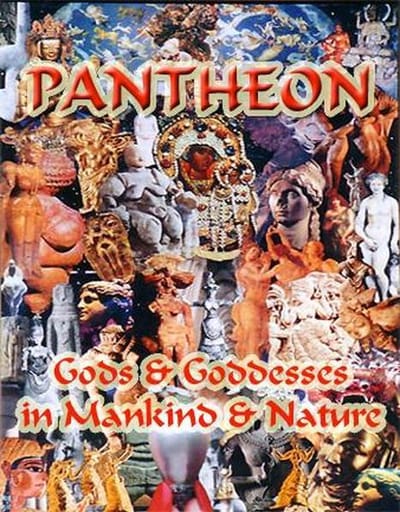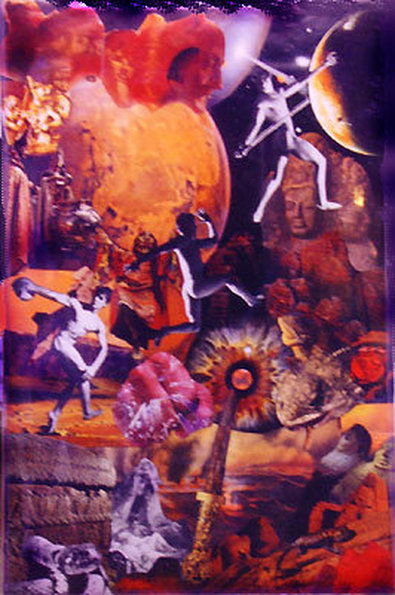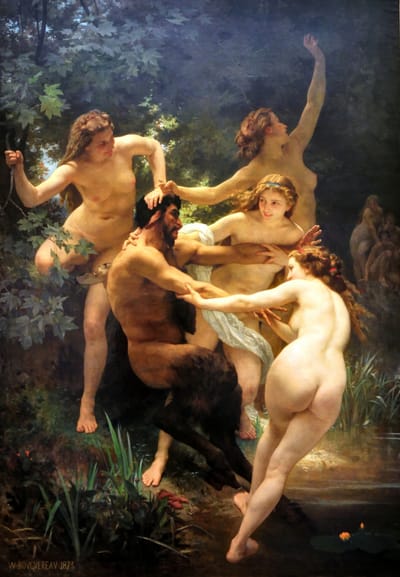Articles #Archetypal Psychology
PANTHEON Holographic Gods by Iona Miller, 1983-2015 https://holographicarchetypes.weebly.com/pantheon.html Traditional folk tales and multicultural myths can be used as powerful tools because they are repositories of ancient wisdom about the human condition and because they teach the language of symbolism, imagery, and metaphor. These wisdom tales can help us gain insight into behavior and can function as effective catalysts for bringing about change. Through storytelling, we can learn the language of metaphor, which can help us intuit the existence of deeper meanings and truths. In our language a mythological god is an archetype and an archetype is always at the same time an instinctive pattern, an instinctive basis. The mythic field is the realm of the unconscious. The form of myth emerges as patterns from the field of the Collective Unconscious. Pattern is a language, using fields to describe dynamic relationships and energetics. Each pattern is a field. The field of myth is emotional -- emergent, resonant, challenging -- inviting ritual enactment to animate and embody it. Thus, we recognize and develop our own style of mythic consciousness, stepping in to join with others, daring to live our larger lives within the field of historic life. Such journeys are rites of passage.
Read Morehttps://ionamiller2017.weebly.com/ares.html We are born into a family which we share with more and more contemporary people as we look further back in time. But when we are gathered to the ancestors are we met by the gods? Shall we move Ares from our archetypal altar to the family shrine? Perhaps some of us can. We know there is power in naming. What is it to name something, to name someone, to name someone an ancestor, or even name a god as direct ancestor? It all comes down to our own name. Genealogy is a heritage-led regeneration. Tracing our lines back from our parents, we move deeper into the realm of the ancestors who gave us the substance of life and soul's self-expression. A sense of soul gives us a sense of history. Our sacred and mythic roots inform our primordial human behavior and the timeless soul-world. They act on us through meaning as well as the world stage. This natural unconscious process doesn't need to be driven by a therapeutic or self-development agenda. In a complex and fragmented world, genealogy helps us revision the present. We look back for a context of meaning using our most personal history of being. We also recognize cultural ancestors, collective ancestors, ancestors of our land, and animal ancestors. We don't carry ancestral DNA from all our direct ancestors. But we remain entangled with them in the ancestral field, consciously, or unconsciously. In real, imaginary, and symbolic ways they are meaningful to our wholeness. We reflect as we find our way back. The inner life exerts its manifest influence. Emotions shape our sense of self and relationships. Ares aggression, might and energy have controlled all of history from behind the scenes. History is written by the competitive winners who then self-describe their glorious descent from the gods, insuring their renown and divine right to rule with genealogical propaganda. It is enforced with constant wars and worldview warfare, a battle for minds. The dragon or serpent guards the treasures of the deep unconscious, the unwritten history of mankind, and its myth-spinning capacity. The serpentine path, which is an image for our descent and return, is a way to find our instinct that has no conflicts, because conflicts belong to the discriminating conscious mind.
Read MorePAN https://ionamiller2020.weebly.com/pan.html When Pan is dead, then nature can be controlled by the will of the new God, man, modeled in the image of Prometheus or Hercules, creating from it and polluting in it without a troubled conscience. (Hercules who cleaned up Pan’s natural world first, clubbing instinct with his willpower, does not stop to clear away the dismembered carcasses left to putrefy after his civilizing creative tasks. He strides on to the next task, and ultimate madness). As the human loses personal connection with personified nature and personified instinct, the image of Pan and the image of the devil merge. Pan never died, say many commentators on Plutarch; he was repressed. Therefore as suggested above, Pan still lives, and not merely in the literary imagination. He lives in the repressed which returns, in the pathologies of instinct which assert themselves, as Roscher indicates, primarily in the nightmare and its associated erotic, demonic, and panic qualities."--Hillman Pan and the Nightmare James Hillman "Panic, especially at night when the citadel darkens and the heroic ego sleeps, is a direst participation mystique in nature, a fundamental, even ontological experience of the world as alive and in dread. Objects become subjects; they move with life while one is oneself paralyzed with fear. When existence is experienced through instinctual levels of fear, aggression, hunger, or sexuality, images take on compelling life of their own. The imaginal is never more vivid than when we are connected with it instinctually. The world alive is of course animism; that this living world is divine and imaged by different gods with attributes and characteristics is polytheistic pantheism. That fear, dread, horror are natural is wisdom. In Whitehead's term "nature alive" means Pan, and panic flings open a door into this reality." --Hillman p.33, Pan and the Nightmare This brilliant book brings Pan back to life by following C. G. Jung's famous saying: "The Gods have become our diseases." Chapters on nightmare panic, on masturbation, rape and nympholepsy, on instinct and synchronicity, and on Pan's female loves-echo, Syrinx, Selene, and the Muses-show the goat-God at work and play in the dark drives and creative passions of our lives. Hillman's insights present the archetypal figure in the depths of nature and archetypal psychology as a method of revelation.Pan and the Nightmare (which includes a full translation of Wilhelm Roscher's masterful 19th-century mythological-pathological treatise on Pan and the demons of the night) is the most radical study of this God ever undertaken. The body of the work is a translation of a monograph by Wilhelm Heinrich Roscher, ‘Ephialtes: A Pathological-Mythological Treatise on the Nightmare in Classical Antiquity’. A co-founder with Nietzsche of the University of Leipzig’s Philology Club, Roscher is lauded by Hillman as a great example of the kind of nineteenth century scholar whose voluminous, wide-ranging knowledge and enthusiasm for the psychological reality of his subject led to flawed but valuable efforts of synthesis and comparison. As Hillman eloquently argues, the “psychological ferment” of the time (Roscher’s monograph appeared in the same year as Freud’s Interpretation of Dreams) means we “may not blame Roscher for the wide casting of his net nor for some of the odd fish he comes up with.” Equally valuable is Hillman’s introductory essay, nearly as long as Roscher’s work, in which he applies his characteristically shrewd, penetrating and original psyche-oriented analysis to Roscher’s subject. Classic psychological concepts such as instinct, the uncanny, synchronicity and repressed sexuality are given fertile new frames via Pan’s irresistible force and the shock of the nightmare experience. THE GREAT GOD PAN IS DEAD. "Plutarch mentions, that in the reign of Tiberius, an extraordinary voice was heard near the Echinades, in the Ionian sea, which exclaimed, that the great Pan was dead. This was readily believed by the Emperor, and the astrologers were consulted; but they were unable to explain the meaning for so supernatural a voice, which probably proceeded from the imposition of one of the courtiers who attempted to terrify Tiberius." Lempriere. "This event occurred, supposedly in the first century A.D., during the reign of Tiberius, in a Roman world in which the rationalistic and evolutionary approach to religion had already done much to bring death not only to Pan but to many of the other greater and lesser Gods of the Greek Pantheon." Robert B. Palmer, in the Introduction, to Dionyus, Myth and Cult, W.F.Otto, p. x. A cry went out through late antiquity: "Great Pan is dead!" Plutarch reported it in his "On the failure of the Oracles, " yet the saying has itself become oracular, meaning many things to many people in many ages. One thing was announced: nature had become deprived of its creative voice. It was no longer an independent living force of generativity. What had had soul lost it: or lost was the psychic connection with nature. With Pan dead, so too was Echo; we could no longer capture consciousness through reflecting within our instincts. They had lost their light and fell easily to asceticism, following sheepishly without instinctual rebellion their new shepherd, Christ, with his new means of management. Nature no longer spoke to us-- or we could no longer hear. The person of Pan the mediator, like an ether who invisibly enveloped all natural things with personal meaning, with brightness, had vanished... When Pan is alive then nature is too, so the owl's hoot is Athena and the mollusk on the shore is Aphrodite... When Pan is dead, then nature can be controlled by the will of the new God, man, modeled in the image of Prometheus or Hercules, creating from it and polluting in it without a troubled conscious... As the human loses personal connection with a personified nature and personified instinct, the image of Pan and the image of the devil merge. Pan never died, say many commentators on Plutarch, he was repressed... Pan still lives... in the repressed which returns, in the psychopathologies of instinct which assert themselves, as Roscher indicates, primarily in the nightmare and its associated erotic, demonic, and panic qualities." James Hillman, A BLUE FIRE: pp.97-98 (originally in "Pan": 24-25,33, 54)
Read More


